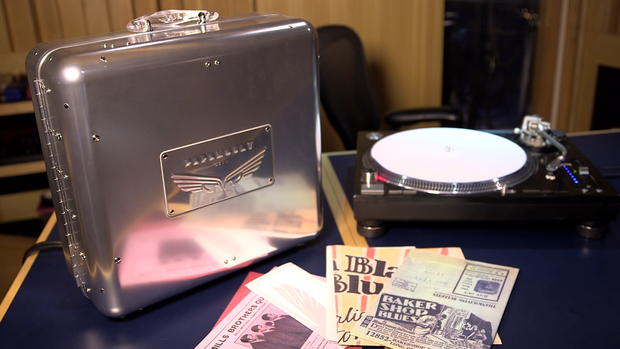Jack White rescues archives of Paramount importance
This piece originally aired November 29, 2014.
Jack White is best known for his days in the retro garage rock band The White Stripes. For his latest project, White is reaching way back to the early-1900's, acting as a musical historian with the release of "The Rise and Fall of Paramount Records," which is up for a Grammy on Monday night.
Geeshie Wiley's eerie lament, "Last Kind Word Blues," was recorded in 1930, reports CBS News correspondent Anthony Mason.
"Now imagine being in the room while she's recording this song," Jack White said with a grin.
The original 78 was released by Paramount Records, a powerhouse in black music before the war. The extraordinary rise and fall of Paramount is chronicled in a two-volume box set.
"So what were you trying to show with this?" Mason asked White.
"How ludicrous that I could be, really, with my free time," White responded, smiling.
Co-producer White, the former White Stripes front man and founder of Third Man Records, spent three years on the project, which includes 1,600 tracks.
"You can sit down on a Sunday and spend seven hours with this, and you've still only gotten through about 5 percent of it," White said.
Paramount records would unwittingly change the course of American music. Started by the white-owned Wisconsin Chair Company, which also made wooden cabinets for phonographs, Paramount was created to spur sales. The label released artists in all genres, but they're biggest sellers were "race" records.
Blind Lemon Jefferson's 1926 record, "Long Lonesome Blues," would sell in the six figures.
But it all started with Mayo Williams, a Brown University graduate, who scoured the South looking for talent.
"There was Mayo Williams who was a producer and he was their link to African-American culture," White said.
"In a way, he was the first African American music executive," Mason said.
"I think so. I think he's really important," White said.
Paramount artists would include a young Louis Armstrong, Ethel Waters, Jelly Roll Morton and Charlie Patton, father of the delta blues. The label advertised in African-American papers like the Chicago Defender.
"They mythologize all the blues musicians, which is always beautiful," White said. "But there's also these incredible illustrations and drawings and no one has any idea who did these drawings. He's just a ghost; he's lost to time. Him or her."
In a way, White is bringing back a lot of ghosts.
"Well, don't I look like one?" he asked, adding, "There's so many of those singers where you just have a name and there's no photograph, no record of who they are, where they came from. That's it. And we're lucky to have that."
The depression took down Paramount. The last recordings were made in 1932. But Jack White's labor of love helps ensure Paramount's place in music history.
"I want it to be something 100 years from now, 200 years from now, someone will drag out of the attic and it'll inspire some songwriter then who will listen to Charlie Patton or Geeshie Wiley and find something beautiful, trigger something new and carry that forward," White said. "I hope that happens with it."
The stunning $400 boxed set includes an 800-song USB drive, six vinyl records and two books on Paramount's history.
